[ad_1]
Until one quick week in the past, the geopolitical stability in Ukraine could possibly be likened to Zugzwang, a phrase describing a fragile level in a board sport when taking any transfer will in all probability put a participant at a drawback.
For the west, because it ready to assemble with different world leaders on the UN normal meeting in New York, there gave the impression to be no good possibility, aside from hanging on. It may hardly retreat in its help for Ukraine – an excessive amount of of the liberal democratic order had been declared to be at stake, an excessive amount of Ukrainian blood spent, an excessive amount of western treasure expended, together with $5bn (£4.27bn) a month simply to finance the Ukrainian state. The US alone has spent $15.5bn for the reason that begin of the battle.
But if the west continued with its plan to squeeze Russia economically, an more and more determined Putin was sure to show off all of the gasoline coming from Russia, not simply that coming by way of the Nord Stream 1 line, however all pipelines. Given the refusal of oil producers, from Riyadh to Tehran, to come back to Europe’s rescue and improve oil manufacturing, hundreds of thousands of European customers are liable to freezing or going bankrupt this winter.
The price of shielding European electorates from that rise in electrical energy and gasoline – now put at €500bn (£433bn) – nonetheless threatens to wreck budgets, with central banks below stress to maintain elevating rates of interest to stem inflation working at 9.8%, the best in 25 years.
Whereas all these calculations don’t disappear, they’ve been radically altered on account of the shock Ukrainian army advance. Western officers are cautious a few turning level, however Justin Bronk, on the British thinktank Rusi (Royal United Providers Institute), stated: “Into the winter, no matter how a lot territory Ukraine takes earlier than climate shuts issues down for either side in November, there will be no extra doubts that Ukraine can win, if supported correctly. The road of argument that it isn’t value persevering with to produce Ukraine as a result of it prolongs the stalemate is now not an argument. Victory is now seen and credible.”
Annalena Baerbock, the German international minister, talking in Kyiv because the affect of the offensive took form on Saturday, stated it was “a second of hope”. After an extra 24 hours of advances, a fierce debate in German politics had damaged out in regards to the direct provision of heavy weapons, together with Leopard tanks. Agnieszka Brugger, the Greens’ deputy group chief within the Bundestag, stated: “All choices need to be put to the check once more with none ban on pondering. These are essential months for the folks of Ukraine and for order on our continent.”
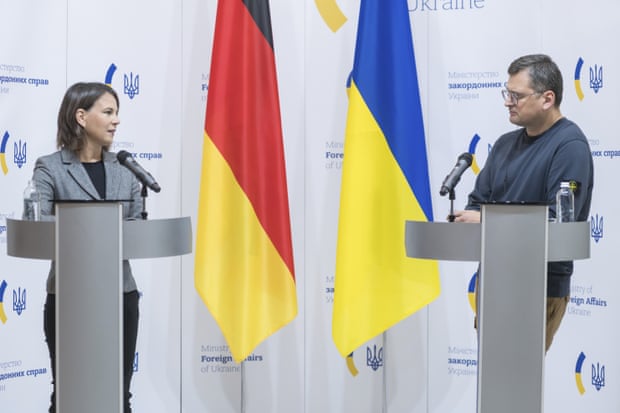
As a substitute of providing solely a expensive grinding stalemate, by which – in Vladimir Putin’s phrases – European prosperity is thrown into the furnace of sanctions, western leaders can now discuss of the de-occupation of Ukraine, and sound believable. “This counteroffensive reveals that we are able to win,” stated Ukraine’s ambassador to the US, Oksana Markarova. The French ambassador to Ukraine, Étienne de Poncins, even speculated considerably prematurely that autumn could possibly be “the season of victory”. In that case, minds should flip to what brutal, even nuclear, strategies Putin may make use of with a purpose to stop collapse.
However for the second, the raging battle of narratives is not going to stop, together with on the UN subsequent week – itself largely marginalised as a physique by Russia’s veto on the safety council. The Russian international minister, Sergei Lavrov, shall be cornered if the present army reverses grow to be extra stark, however his capacity to brush apart all criticism – and reshape the reality – is known.
Ukraine’s advance may also unnerve Beijing, because it promised Russia a friendship with out limits. As Richard Haass, the president of the Council on Overseas Relations, factors out: “It was China’s objective to divide the west, however its alignment with Russia has finished the alternative.”
Furthermore, if China is to stay an efficient counter to the US, one that draws non-aligned states, it badly wants Russia to achieve japanese Ukraine. The most important loser from a Russian defeat in Donetsk, by way of status on the UN, could be China’s president, Xi Jinping.
However even now western leaders will look anxiously out from their chandeliered places of work for indicators of whether or not Europe will buckle or stand agency. The stress shouldn’t be but off.
Nathalie Tocci, the director of the Italian Institute of Worldwide Affairs, argues that it’s nonetheless a check of two conflicting views of Europe’s resilience, one held by Putin and the opposite by Jean Monnet, the religious founding father of the EU.
Putin, she says, assumes western Europe’s affluent, however morally corrupt, liberal democracies will finally affirm their feeble incapacity to endure ache. He can’t think about Europe throwing itself over an financial cliff – “all for a rustic that in his thoughts doesn’t even exist”. In contrast, Monnet argued in his memoirs that Europe’s power “is cast in crises, and would be the sum of the options adopted for these crises”.
Each time Europe is challenged and falls, whether or not Covid or the euro, it is not going to solely elevate itself up, however transfer ahead into the following stage of adjustment and integration, thus turning disaster into alternative. Tocci says it’s nonetheless unimaginable to inform which interpretation of European resilience will finally triumph.
Moscow’s disinformation items after all prefer to undertaking a Europe in a state of revolt towards rising costs and its uncaring elites. The proof for a populist revival to this point is patchy.
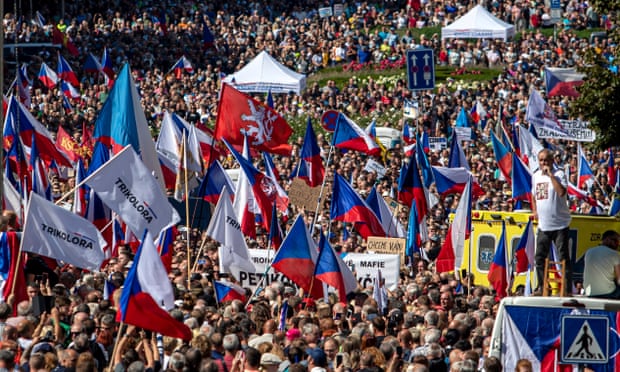
In Prague, 70,000 turned out in Wenceslas Sq. on 3 September to protest towards the value rises, splitting the federal government in its response, with the pro-western prime minister, Petr Fiala, describing the organisers as Putin fifth columnists who imagine the answer to excessive power costs is to depart Nato and the EU. In contrast, Pavel Blažek, the justice minister, stated the folks within the crowd weren’t Putin fanatics, however folks fearful about falling residing requirements who deserved to be taken critically. The organisers stated one other Czechia First demonstration was deliberate for later this month. Their slogan is straightforward: “This isn’t our battle.”
The Slovakian authorities teeters on the brink, however largely over inner points, and in parliamentary elections in Italy and Sweden, surging rightwing populists have performed on the implications of the battle, however solely not directly. Help for Ukraine within the US is essentially bipartisan, and few US politicians will wish to disassociate themselves from what appears to be like like a US army success.
General, a Eurobaromoter ballot carried out in June and July discovered 68% of Europeans supported offering arms to Ukraine, whereas 78% supported financial sanctions imposed by the EU on the Russian authorities, firms and people. More moderen German polls for ZDF confirmed 70% help for sanctions towards Russia, and a unprecedented 90% help amongst German Inexperienced supporters. The primary try by German leftists to start out “a scorching autumn” led to failure with few answering the decision to take to the streets in Cologne. The reputations of particular person politicians, equivalent to Robert Habeck, have taken a success, however not the battle they advocate.
Moscow propagandists will attempt to painting Europe as on the point of an 1848-style riot, and Nato will counter this because the work of individuals padlocked into fantasy. Every thing will activate the effectiveness of the measures the EU can conform to cap the value of gasoline, or subsidise the prices. Nobody denies the large political sensitivity. The White Home chief of employees, Ron Klain, tweets most days the presently falling worth of gasoline.
However what has been probably most important diplomatically up to now month is that European leaders, after a distinctly divided preliminary response to the invasion in early spring, seem to have recovered their nerve, and had finished so even earlier than the shock breakthroughs of the newest Ukrainian army offensives.
In a collection of frank, reflective speeches over the previous month, leaders in Paris, Brussels, Berlin and Washington have emerged resilient and recharged, able to affiliate themselves in a fuller ideological approach with a battle that will final by winter. The speeches could have been partly a diplomatic offensive by Berlin and Paris making an attempt to reassure Baltic and east European states, however they have been additionally a message of willpower despatched to their very own electorates.
Baerbock, as an illustration, in an article in Die Zeit, argued: “We should face the info: this Russia will for the foreseeable future stay a menace to peace and safety in Europe. This can be powerful to swallow,” she admitted. “We have now to imagine that Ukraine will nonetheless be needing new heavy weapons from its buddies subsequent summer time.” She later stated she would follow her guarantees to Ukraine, no matter voters may assume.
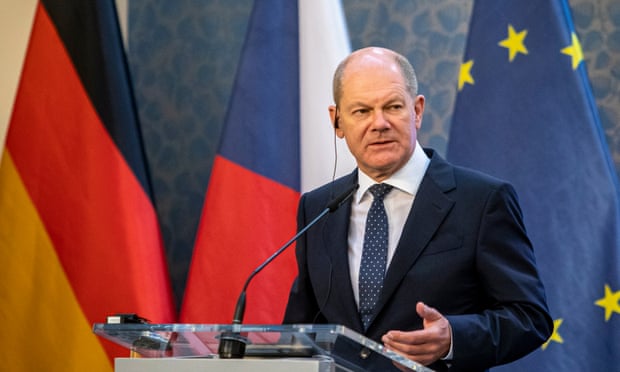
Equally, the German chancellor, Olaf Scholz, in a significant speech on 29 August delivered in Prague, tried to put the foundations for a profound renewal of Germany’s European coverage. The speech was partly a response to an tackle made by Macron in 2017, however it was additionally his argument for a way Europe had to answer the invasion of Ukraine. It ended with a rhetorical query: “When, if not now, are we going to construct a sovereign Europe? Who, if not us, can defend the values of Europe?”
Macron, too, in a marathon speech to French ambassadors on 1 September accepted there was no approach again with Putin, an admission that requires him implicitly to acknowledge that his wager on opening as much as Russia to tie it to Europe, symbolised by the Fort de Brégançon summit in 2019, has not paid off.
Sure, he nonetheless pressured French freedom of manoeuvre from the US over China. He wouldn’t apologise for speaking to Putin, since if he stopped, Putin’s sole interlocutor could be Turkey, and he was silent on whether or not Putin deserved humiliation, one thing he had opposed in Might.
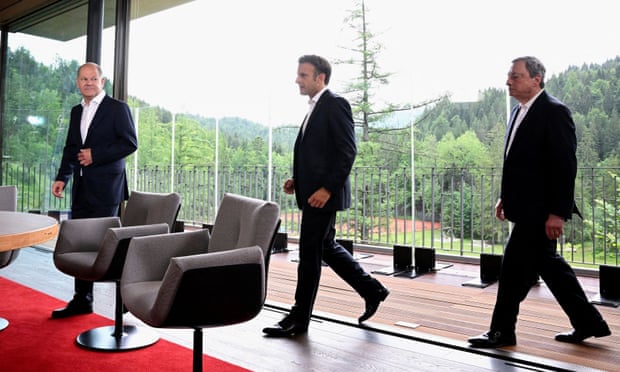
It appeared as if his belated go to to Kyiv on 16 June alongside the the Italian prime minister, Mario Draghi, and Scholz – the place the leaders known as for Ukraine and Moldova to be allowed to start out the EU candidate accession course of – had lastly transformed him. He put the invasion within the context of a problem to liberalism as “the indeniable mannequin and end result of humanity”. Russia, he stated, “had not simply undermined the rules upon which we constructed peace over many years – the territorial integrity of states”, however created a recent relativism that risked being “utterly irreversible”, and “extraordinarily harmful for the interior workings of our democracies”. This was not a battle of territory, or Ukrainian nationalism, however of values.
However working by these speeches, learn by few, was additionally a evident admission of liberal democracy’s weak spot. Baerbock in talking to her ambassadors was probably the most frank. She stated whereas it was true that in March, 141 nations condemned Russia’s invasion on the UN, “nations representing greater than half of the worldwide inhabitants didn’t vote with us. Furthermore, many nations don’t help the sanctions towards Russia.”
Other than the struggling in Ukraine, she stated, “this was the only incontrovertible fact that had bothered her most up to now six months”, to the extent that “it’s one thing I haven’t been capable of cease occupied with”.
She stated the west wanted “to know why, when there’s a selection between proper and mistaken, between victims and perpetrators, a rustic would merely abstain”. Too many nations noticed Ukraine as a regional battle. “They ask time and again the place we have been when conflicts raged of their properties.” Her options have been manifold, however moderately than offering fait accompli, one thing that doesn’t engender belief, the west wanted to pay attention to those abstentionists.
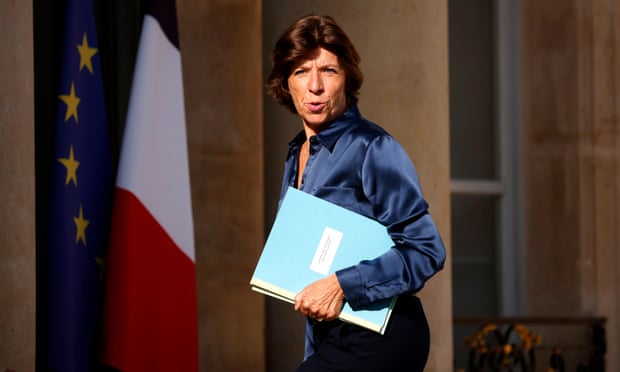
Her French counterpart, Catherine Colonna, made an identical level in her tackle to the French diplomatic corps, warning: “The need to hunt compromises is shedding floor just a little additional on daily basis, confronted with the will to impose views with out compromise, or to simply accept impasse.” She known as for a French “combative diplomacy” and for French diplomats to begin to grow to be clearer message carriers on this new “competitors of values”.
Macron additionally warned that “the abstention nations” represented a mass of humanity. “Which means this good a part of humanity doesn’t absolutely perceive what is occurring.” He stated international leaders informed them of their disenchantment with the west. “Many are saying to us: ‘Is that this mannequin so nice? You appear so sad. We watched what occurred on the Capitol final yr, we are able to see you at house, extremism is on the rise in all places. You may’t remedy excessive poverty. You’re arguing over the local weather.’”
Though Russia was the protagonist, lurking behind the scenes, he claimed it was China “that had structured the camp of abstention, seeks to push its deep pursuits and to principally set up a break up within the worldwide order by establishing a story that claims that these guidelines are centred on US energy”.
The wake-up name about this shallow help for western values on this new multipolar world raises deep historic questions, and at minimal underlines how the top of the chilly battle disadvantaged the west of one in every of its best means of ethical validation.
Ukraine is itself making an attempt to deepen its worldwide help by broadening its diplomatic contacts, however it’s a complicated course of. Dmytro Kuleba, Ukraine’s international minister, admits he isn’t highly regarded in India after telling its management that the oil they purchase from Russia is laced with Ukrainian blood. As for China, he admits little progress has been made.
It’s potential that one thing everlasting will emerge from the camp of abstentionists equivalent to a revival of the dormant non-aligned motion, however that motion has by no means had a cohesive ideology.
But when the western alliance is to draw new buddies, it can require multiple western-sponsored local weather change convention or presidential tour of Africa to undo the harm accrued up to now.
[ad_2]
Source link
